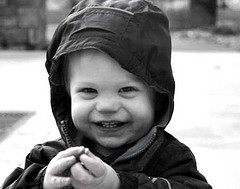It seems everyone who read the post about losing my temper in the supermarket has the same question: what should we do instead of employing the grocery-store grab?
My complete answer to this question will be posted on next week's comment round-up, but here's the short answer: try to be more mindful. When I have those "bad mother" moments, I may feel like I'm losing my mind, but really I've lost my mindfulness.

What is Mindfulness, Really?
Like gratitude, altruism, and strong social ties, mindfulness is definitely a part of the happiness Holy Grail. Jon Kabat-Zinn, the scientist who first "translated" Buddhist practices of mindfulness into a secular program, defines mindfulness as the "awareness that emerges through paying attention on purpose, in the present moment, and non-judgmentally to the unfolding of experiences moment by moment."
You can try being mindful right here, right now. What are you feeling in your body right now? What themes do your thoughts keep returning to—can you notice and label them? Mindfulness is not necessarily a lack of emotion or a state of total calm. We can be feeling furious and pay mindful attention to that experience. Nor is mindfulness necessarily the suppression of thought, or an altered state of consciousness. Mindfulness is often a running conversation with ourselves, describing our experiences as they are happening: I am feeling really frustrated with Fiona…. And then stepping back to label: …frustrated, frustrated. I'm not dealing with her behavior. Denial, not dealing. I just want to get done with this grocery shopping and get out of here. I want her to stop taunting her sister. Wanting, wanting. Notice the lack of judgment that is a part of Kabat-Zinn's definition: I'm reporting what is, not chastising myself for feeling angry at my daughter or for not dealing with her bad behavior.
Parenting Mindfully
Practicing mindfulness doesn't just lead to decreased stress and increased pleasure in parenting, but it also brings profound benefits to kids. Parents who practiced mindful parenting for a year were more satisfied with their parenting skills and their interactions with their children—though no new parenting practices beyond just being mindful had been taught to them. Amazingly, over the course of the year-long study, the behavior of these mindful parents' kids also changed for the better: they got along better with their siblings, were less aggressive, and their social skills improved. All their parents did was practice mindfulness!
So how do we parent mindfully? It takes constant practice. I am well-trained in mindfulness practices, but I still struggle (as detailed in last week's post). Another example of real-life unmindful parenting: the other morning everyone woke up late, and Molly was making us even later. Instead of getting dressed she was drawing. I called from the other room, "Did you feed the dog?" which prompted her to go get her pet rat out of the cage. Without actually taking note of the situation—without any mindfulness, that is—I became more and more irritated with her.
I started to bark orders. "Molly! Get dressed!" And then I let loose a doozy: "Molly! What is up with you!? It is like you are 3 years old, not 6! Do I need to come in there and dress you myself?" For the record, I've never found insulting my children to be particularly effective, and it didn't work this time, either. She flew into a rage, screaming things like, "I'm not going to listen to you if you use mean words!"
If I could rewind the morning and begin more mindfully, things would have been entirely different. All I really needed to do was to take stock of the situation: notice my feelings of anxiety and exhaustion. Notice that Molly's exhaustion was also making her distractible and emotional, and gently help her stay focused rather than boss her around.
Accepting the situation non-judgmentally—rather than futilely trying to force it to be something other than it was, or chastising myself for sleeping through the alarm—would have left me open to more productive and positive alternatives.
![]()
For me, the keys to mindful parenting are as follows: first, notice what is happening (and what you're feeling and thinking) and second, accept what is going on without judgment. If you want to become a more mindful parent—and reap the incredible benefits that come along with it—I highly recommend Myla and Jon Kabat-Zinn's book on this subject, Everyday Blessings: The Inner Work of Mindful Parenting or, if you are a new mother, Cassi Vieten's book Mindful Motherhood.
© 2009 Christine Carter, Ph.D.
Selected References
N.N. Singh, Lanconi, G.E., Winton, A.S.W., Singh, J., Curtis, W.J., Wahler, R.G., McAleavey, K.M., "Mindful Parenting Decreases Aggression and Increases Social Behavior in Children with Developmental Disabilities", Behavior Modification 31, no. 6 (2007).
M. Kabat-Zinn, Kabat-Zinn, J., Everyday Blessings: The Inner Work of Mindful Parenting (New York: Hyperion, 1998).
C. Vieten. Mindful Motherhood: Practical Tools for Staying Sane During Pregnancy and Your Child's First Year. (Berkeley: New Harbinger, 2009)
Join the Campaign for 100,000 Happier Parents by signing this simple pledge.
Become a fan of Raising Happiness on Facebook.
Follow Christine Carter on Twitter
Subscribe to the Happiness Matters Podcast on iTunes.


Comments
This is so true, it is when you start wishing that things were other than how they are, that parenting can become very stressful. I too am working hard on mindfulness.
Catherine | 1:18 am, September 3, 2009 | Link
Another good mindful parenting book is Momma Zen: Walking the Crooked Path of Motherhood, by Karen Maezen Miller. I keep it by my bedside!
Alison Streit Baron | 8:56 am, September 3, 2009 | Link
This is great. Thank you! We are so grateful for you and the work you do.
We used to live in Berkeley and miss it very much!
C.T.A. | 2:46 pm, September 3, 2009 | Link
I’m a psychotherapist who has worked with children and families for 30
years. I’ve cobbled together a model incorporating John Gottman,
Kabat-Zinn and many of the concepts you are teaching, but you are
going far beyond. This is fantastic and I’m learning so much. I’m very
excited about what you are doing and recommending your work to clients
and fellow professionals alike. Thank you, thank you!
C.L. | 2:51 pm, September 3, 2009 | Link
I’m a mom of the happiest eleven-year-old triplets you ever met. You
are so right, that mindfulness – in everything we do – keeps us
centered and focused with heart. But what worked for me were the
following alternatives to physical force of any kind in managing
supermarket bad behavior:
At the first sign, I’d give a verbal warning. If no immediate
response, I’d cheerfully exclaim “Oh, oh! That’s so sad, now we’ll
have to put back the ice cream”. Of course the kids are shocked “Why
Mom?, why? Why are we taking back the ice cream??!!” And I’d
cheerfully tell them “Ice cream goes to kids who are quiet in the
supermarket. You can talk. I love to hear what you see and need, but
no fighting/whining/etc. ” If they pushed it or continued or
protested, it was “Oh Oh! That’s so sad, now back goes the
cookies”….I didn’t have to do this but once and maybe one
reinforcement a few months later.
I’d always travel with a People magazine in the car. If they acted
up, I pulled over and began reading. It only took a minute for them
to notice we weren’t getting anywhere at all and I was happily reading
behind the wheel. I never had a problem with them misbehaving in the
car! I would stick a copy in my bag and pop it out if they were
misbehaving in a store as well. I might look a bit funny leaning
against my cart enjoying my magazine, but kids hate it when they have
to stop and prolong being wherever they don’t like being anyway. It
is disrespectful of them to take their feelings out to that level on
Mom, irresponsible of Mom to allow it – we need our energy and good
nature to be able to parent the kids, and need to model good self care
without losing control ourselves!
Hope this helps.
S.L. | 2:54 pm, September 3, 2009 | Link
Mindful parenting seems so simple, yet is so powerful. I have been trying to be mindful in all I do, but also thoughtful, by which I mean thinking of the results of my actions (hopefully BEFORE I act). While I may feel angry with my children, when I think about the results of yelling at them I remember that they are not the results I would actually like to see. Being mindful of what is happening and how I am feeling helps me to look ahead to the potential consequences of my response.
Like all Moms, I am far from perfect. I so appreciate forums like this one, and all the recommended reading. Reading, for me, is an act of thoughtfulness, slowing me down and giving me time to reflect. THANKS.
Laura Lamarre Anderson | 8:00 am, September 4, 2009 | Link
I love the idea of mindful parenting, but have to admit I find it difficult when in the heat of the moment with my kids. One thing that helped me immensely was an explanation of mistaken behaviors that I learned about at a parenting class a few years ago. The teacher, Vicki Hoefle, explained that how we feel as parents are clues to why our children are behaving a certain way. For example, when time with my children leaves me feeling tired, frustrated, and annoyed, I’ve learned that my kids are saying notice me!, involve me!. They mistakenly believe that they are only important to me when they have all of my attention– which is exhausting. Now that I can understand what they’re really trying to say, I can be more mindful by addressing that mistaken belief. What they really want is a connection and genuine interest from me. I try to give them a job, listen to what they’re telling me and ask lots of questions, set time aside when I can focus only on them, or generally take an interest in what they are doing. It’s like filling up the gas tank: if I can spend 15-20 quality minutes with each of my kids, they can run on that for hours. As Vicki says, connection leads to cooperation. Her web site gives more information at http://www.parentingontrack.com.
Emily Bradbury | 8:14 am, September 8, 2009 | Link
Parenting is like any other spiritual practice. It is hard work, it takes discipline, it takes love, it takes patience and while it is rewarding, the rewards are not always immediate. Having children does not have to hinder one’s growth, it can actually fuel it.
For example: it is hard work to be mindful – my children are little mirrors, they remind me that I need to think about everything I do and say. With them being mindful is vital. They re-enforce all the work I am doing to grow as a person.
It helps when I think: “I can be present in this moment, I can hold love in my heart, I love my child.”
It is difficult to cultivate this, but not impossible.
Fabulous post, couldn’t agree more.
——-
Breeder | 10:43 pm, October 2, 2009 | Link